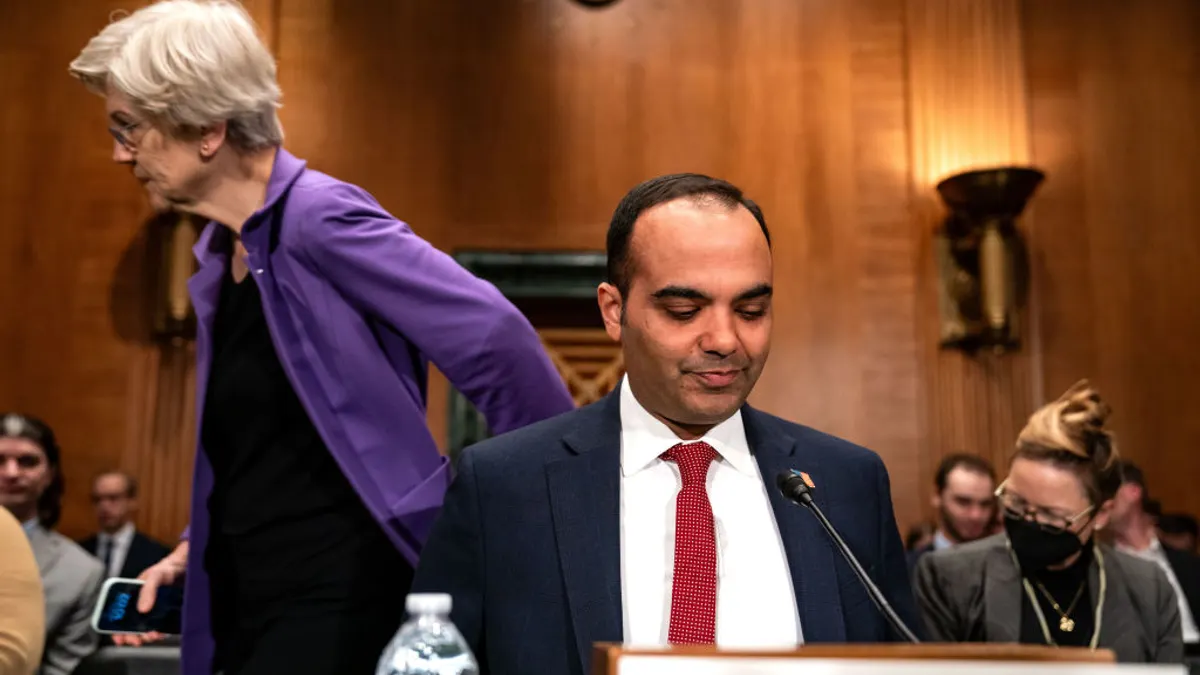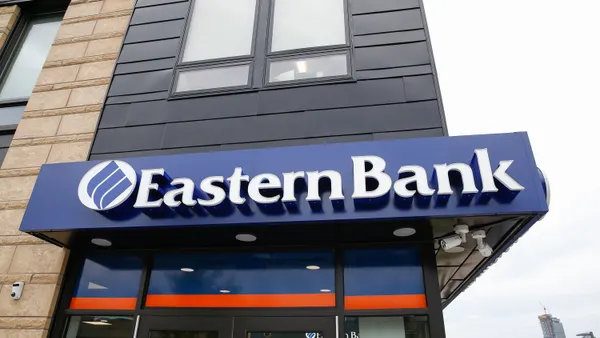Dive Brief:
- Sen. Elizabeth Warren, D-MA, and Rohit Chopra, former director of the Consumer Financial Protection Bureau, on Tuesday blasted the Department of Government Efficiency’s efforts to reduce federal spending, warning that deep cuts at government agencies could contribute to financial instability.
- “The damage DOGE is doing is everywhere in our economy, including with the financial regulators,” Warren said during a press call on the Trump administration’s economic actions. “There will be a real price to pay for that.”
- Chopra warned that DOGE is shuttering government functions, including those covered by major units in the CFPB, that will be crucial if a recession occurs. “All of those investigators and inspectors have been benched. We are paying them to do nothing,” Chopra said. “And we will not be ready if there are serious issues in the mortgage markets.”
Dive Insight:
Warren, the ranking member of the Senate Banking Committee, accused President Donald Trump and billionaire Elon Musk of threatening the Federal Deposit Insurance Corp.’s reputation and abilities, and compromising consumers’ confidence in federally insured deposits.
Trump and Musk “are taking a chainsaw to our financial regulators, including the FDIC, and putting at risk the confidence that the American people have built over decades in knowing that that insurance program will work and the bank supervisors will keep a close eye on all of the financial institutions,” Warren said.
FDIC insurance can be counted on “because those regulators are strong and independent, and because they have enough people to be able to do the oversight that is necessary,” Warren said, “and Donald Trump is trying to take all of that away.”
The FDIC is looking to reduce its workforce by about 1,250 employees, the agency said in a memo last week, amid reports that the regulator began working with DOGE to identify positions that could be cut. Warren has grilled FDIC Acting Chair Travis Hill over DOGE’s presence and warned that job cuts could affect the agency’s ability to prevent future bank failures.
Musk, who’s been heavily involved with DOGE and spearheaded efforts to target federal “waste, fraud, and abuse,” said last week he would be pulling back from the initiative. DOGE has hit roadblocks with some of its efforts, such as pursuing cuts at the CFPB. Musk in February posted “CFPB RIP” on social media site X, which he owns, on the day after DOGE representatives entered CFPB headquarters.
Warren led a group of 40 Democratic senators that sent a Monday letter to Acting CFPB Director Russ Vought, asking how the bureau would be able to fulfill statutorily mandated functions if nearly 1,500 employees are cut. That’s an issue the Government Accountability Office said last week it would investigate.
Chopra, meanwhile, pointed to a rise in uninsured deposits amid the intense market turmoil of the past few weeks.
“There has actually been an uptick in uninsured deposits at Wells Fargo, Bank of America, JPMorgan Chase,” he said. Some of that may be due to consumers withdrawing from investment or brokerage accounts, while some of it is coming from small or large businesses adding uninsured deposits, he said.
“I’m especially focused on the older households who are worried about – do they not want it in the stock market? Are they now parking too much in an uninsured account?” Chopra said.
He referred to the January failure of Chicago-based Pulaski Savings Bank, saying when a small bank fails, “the people who get a haircut are the local church, and those older households who keep much of their retirement savings in an account over the uninsured balance.”
Chopra encouraged consumers to put funds in multiple accounts, or expand their limit within the same account by opening a short-term certificate of deposit, for example.
“The volume of uninsured deposits in the system is still a huge concern,” Chopra said, adding that Congress should pass laws to expand deposit insurance for low- or no-interest accounts.
The former CFPB director also noted Congress’s move to overturn the bureau’s overdraft fee rule.
“Weirdly, the president hasn’t signed it yet,” Chopra said, adding that suggests a lack of clear communication between lawmakers and Trump.
The House voted this month to overturn through the Congressional Review Act the CFPB’s final rule that would cap overdraft fees at $5, less than two weeks after the Senate passed a similar resolution.
“What I’m seeing from Congress is mostly just junk legislation,” Chopra said. “They’re not actually doing the things you’re supposed to do when a recession is imminent.”
As for the workforce, Chopra asserted that federal employees who have found new jobs “cannot even figure out how to resign because nobody is there to process their paperwork.”
“They literally are asking to get off the federal payrolls to move to something else, but the basic infrastructure is absolutely not working,” Chopra said of the effect of DOGE’s cuts.












